|
|
|
Sort Order |
|
|
|
Items / Page
|
|
|
|
|
|
|
| Srl | Item |
| 1 |
ID:
105755


|
|
|
|
|
| Publication |
2011.
|
| Summary/Abstract |
This review paper deals with colligated aspects of the BioPlus Project (ERA-ARD) implemented by Institute of Technology and Life Sciences (Poland) and Lithuanian University of Agriculture Institute of Agro-Engineering (Lithuania) in cooperation with National University of Life and Environmental Sciences of Ukraine Institute of Ecobiotechnologies and Bioenergy (Ukraine). The drawn inferences intended to be an auxiliary material for policy makers and can briefly indicate on direction of the regional development of rural Ukraine, focusing on: (i) country's specific and sub-regional assessments of renewable energy potentials and spheres of its application; (ii) identification of major barriers for the expansion of renewable energy technologies and policy guidance to overcome those barriers; (iii) recommendations for future actions and strategies concerning renewable energy in Ukraine. The article concludes that low contribution of bioenergy towards rural development is to a large extent driven by energy policy that inhibits the delivery and use of modern energy sources in rural Ukraine. Consequently, an incentive for achieving bioenergy's future that has greater relevance to development of the Ukraine's regions requires a mix of policy tools and institutional actions, briefly summarized in this paper.
|
|
|
|
|
|
|
|
|
|
|
|
|
|
|
|
| 2 |
ID:
142716
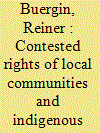

|
|
|
|
|
| Summary/Abstract |
The conceptualization of interrelations between biological and cultural diversity since the 1980s indicates a biocultural turn in discourses and policies regarding nature conservation, sustainable development, and indigenous peoples. These interrelations frequently manifest as conflicts between local communities who derive their livelihoods and identity from their lands and resources, and external actors and institutions who claim control over these areas, invoking superior interests in nature conservation, development, and modernization. In these asymmetric conflicts over biocultural diversity, framed in discourses that demand the preservation of both biological and cultural diversity, the opportunities for local communities to assert their claims crucially depend on external discursive and legal frameworks.
|
|
|
|
|
|
|
|
|
|
|
|
|
|
|
|
| 3 |
ID:
128099


|
|
|
|
|
| Publication |
2012.
|
| Summary/Abstract |
Followign Tullow Oil's major discovery in Turkana county,Kenya has seen a surge in interest from foreign oil companies. Jeremy Clarke assesses the various security risk facing the country's nascent oil industry and the likely impact on the 2013 election.
|
|
|
|
|
|
|
|
|
|
|
|
|
|
|
|
| 4 |
ID:
176490


|
|
|
|
|
| Summary/Abstract |
With much fanfare, Ghana's Jubilee Oil Field was discovered in 2007 and began producing oil in 2010. In the six coastal districts nearest the offshore fields, expectations of oil-backed development have been raised. However, there is growing concern over what locals perceive to be negative impacts of oil and gas production. Based on field research conducted in 2010 and 2015 in the same communities in each district, this paper presents a longitudinal study of the impacts (real and perceived) of oil and gas production in Ghana. With few identifiable benefits beyond corporate social responsibility projects often disconnected from local development priorities, communities are growing angrier at their loss of livelihoods, increased social ills and dispossession from land and ocean. Assuming that others must be benefiting from the petroleum resources being extracted near their communities, there is growing frustration. High expectations, real and perceived grievances, and increasing social fragmentation threaten to lead to conflict and underdevelopment.
|
|
|
|
|
|
|
|
|
|
|
|
|
|
|
|
| 5 |
ID:
125894


|
|
|
|
|
| Publication |
2013.
|
| Summary/Abstract |
With the 'global land grab' now a primary ongoing process in the developing world, greater attention to region-specific analyses provides critical insights for effective policy responses. The Indian Ocean world has the greatest regional concentration of large-scale land acquisitions (LSLAs) globally, and it is also where most of the investor countries reside. Yet examination of Indian Ocean-specific patterns and processes of LSLAs is lacking. One of the most sought after categories of lands are those in forested or recently forested areas, owing to their high potential natural resource and agricultural value. This review article examines the primary issues, actors and impacts of LSLAs of forest-related lands in the broader Indian Ocean world, while assessing the opportunities for national populations of target countries as well as investors and the key social and environmental concerns requiring policy attention.
|
|
|
|
|
|
|
|
|
|
|
|
|
|
|
|
| 6 |
ID:
130644


|
|
|
|
|
| Publication |
2013.
|
| Summary/Abstract |
With the 'global land grab' now a primary ongoing process in the developing world, greater attention to region-specific analyses provides critical insights for effective policy responses. The Indian Ocean world has the greatest regional concentration of large-scale land acquisitions (LSLAs) globally, and it is also where most of the investor countries reside. Yet examination of Indian Ocean-specific patterns and processes of LSLAs is lacking. One of the most sought after categories of lands are those in forested or recently forested areas, owing to their high potential natural resource and agricultural value. This review article examines the primary issues, actors and impacts of LSLAs of forest-related lands in the broader Indian Ocean world, while assessing the opportunities for national populations of target countries as well as investors and the key social and environmental concerns requiring policy attention.
|
|
|
|
|
|
|
|
|
|
|
|
|
|
|
|
| 7 |
ID:
132403
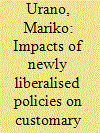

|
|
|
|
|
| Publication |
2014.
|
| Summary/Abstract |
Based on interviews and participant observation conducted in the province of East Kalimantan, Indonesia, from 2008 to 2012, this paper examines why the agrarian reforms have failed to secure the land rights of local farmers. Since the fall of the authoritarian government in 1998, Indonesia has seen limited, but growing government recognition of customary land rights of local farmers living in forest areas. I present a case study of two villages, in which the greater discretion on the part of the local community to negotiate with large-scale oil palm estates has led to the abuse of power by local elites, as well as territorial tensions between local communities. The finding questions the optimistic view that state recognition of customary land rights of communities would automatically lead to the security of landownership of local farmers, and its underlying image of harmonious local communities in which members share coherent interests. The agrarian reform that has centred on communities' rights of control over land and natural resources is problematic. When local communities do not possess capabilities for resolving conflicts in an equitable and transparent manner, third-party intervention is needed to assist communities to strengthen local land rights.
|
|
|
|
|
|
|
|
|
|
|
|
|
|
|
|
| 8 |
ID:
129933
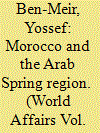

|
|
|
|
|
| Publication |
2014.
|
| Summary/Abstract |
Yossef Ben-Meir provides recommendations for promoting human development driven by local communities-vitally needed in the Arab Spring region-by analysing Morocco's experience and major ideas and lessons from the field of international development. He also connects decentralisation and human development to the cases of Egypt, Palestine and the Western Sahara and highlights their essential role in the context of globalisation and free trade.
|
|
|
|
|
|
|
|
|
|
|
|
|
|
|
|
| 9 |
ID:
086986
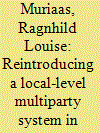

|
|
|
|
|
| Publication |
2009.
|
| Summary/Abstract |
This Article analyses the dynamics beteen the incumbent movement and the emerging opposition in local communities in Uganda in the months following the referendum in July 2005, in a multiparty system in Uganda.
|
|
|
|
|
|
|
|
|
|
|
|
|
|
|
|
| 10 |
ID:
172163


|
|
|
|
|
| Summary/Abstract |
Countries that sign a peace agreement to emerge from protracted violent conflict often begin reconstructing their societies amidst continued high levels of violence. Responding to this situation, national security policies often identify core threats primarily from a state perspective, disregarding local community perceptions of threat and insecurity. This paper is based on interviews conducted in Colombia with members of three rural communities that have undergone and still suffer from different forms of post-accord violence. Differentiating between measurable and lived security threats, it identifies the communities’ perceptions of threats to their current security situation and compares them to those of the state security actors stationed in the communities. Embedded in the call for more pragmatic, bottom-up peacebuilding, we argue that security is context-specific and stress the importance of understanding the diversity of local community perspectives on security for building sustainable peace under conditions of ongoing violence. Final policy recommendations thus underline the need for a more differentiated approach towards improving security levels that meets the specific threat perceptions and security concerns of local communities and improves cooperation between the communities and state security actors to bring sustainable, localized peace to context-specific security environments.
|
|
|
|
|
|
|
|
|
|
|
|
|
|
|
|
| 11 |
ID:
149941


|
|
|
|
|
| Summary/Abstract |
Wind power development projects often include compensation for the affected communities, but little is known about the efficacy of the alternative compensation mechanisms. This study addresses this question by examining the relative potential of private and public compensation. We conduct a Choice Experiment (CE) that investigates household preferences of compensation for the local siting of a hypothetical wind park. Households chose among different alternatives, where each alternative was characterized by three varying attributes: the number of turbines, the level of private compensation, and the level of public compensation. Results indicate the wind park imposes welfare losses to local residents and non-local recreational users, with about 35% of these losses corresponding to non-use values. Findings show that households prefer public compensation to private compensation, with household’s willingness to accept being lower with public compensation than private compensation. This finding suggests that estimates of local resistance to wind development depends on the compensation mechanism.
|
|
|
|
|
|
|
|
|
|
|
|
|
|
|
|
| 12 |
ID:
115118
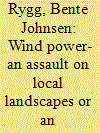

|
|
|
|
|
| Publication |
2012.
|
| Summary/Abstract |
Wind power development has produced controversies in many places. Some people see wind power as a sustainable source of energy, others see it as destroying nature and landscapes. The opposition to wind power is often asserted to be from local forces and NIMBYism, and support to be based on the national and global benefits of increased supply of renewable energy. In this paper, I challenge this view by analyzing how local communities with established or planned wind power parks went through the process of developing wind power, what arguments they used and how they think about the wind power technology and its expected local effects. I found that most of the arguments in favor of wind power development addressed local concerns regarding the economy, modernization, and employment opportunities and not a need for sustainable energy. The opposition to wind power development was not based on NIMBYism. Rather, many different arguments were used, and the features of the controversies were distinct to each community.
|
|
|
|
|
|
|
|
|
|
|
|
|
|
|
|
|
|
|
|
|